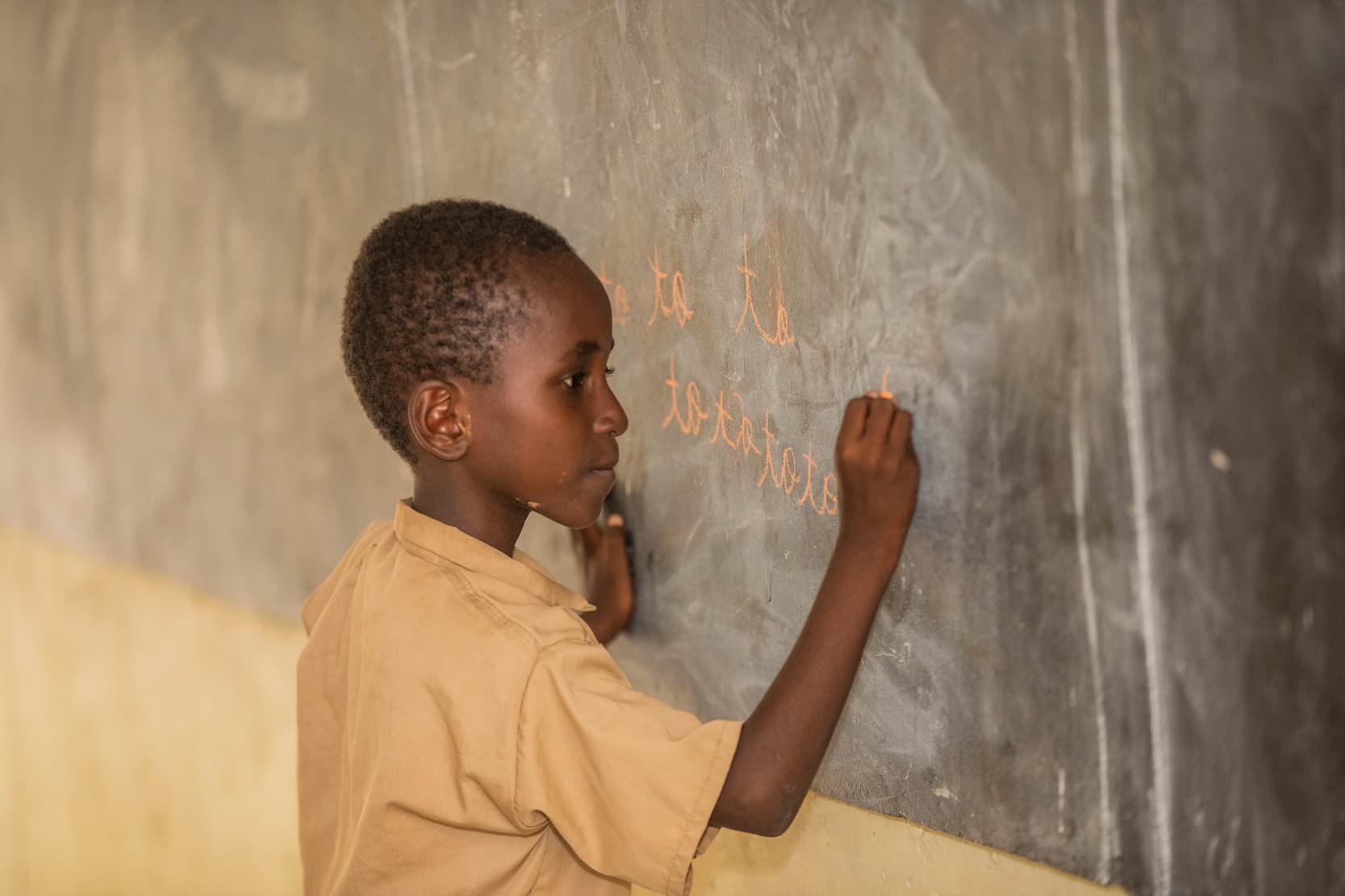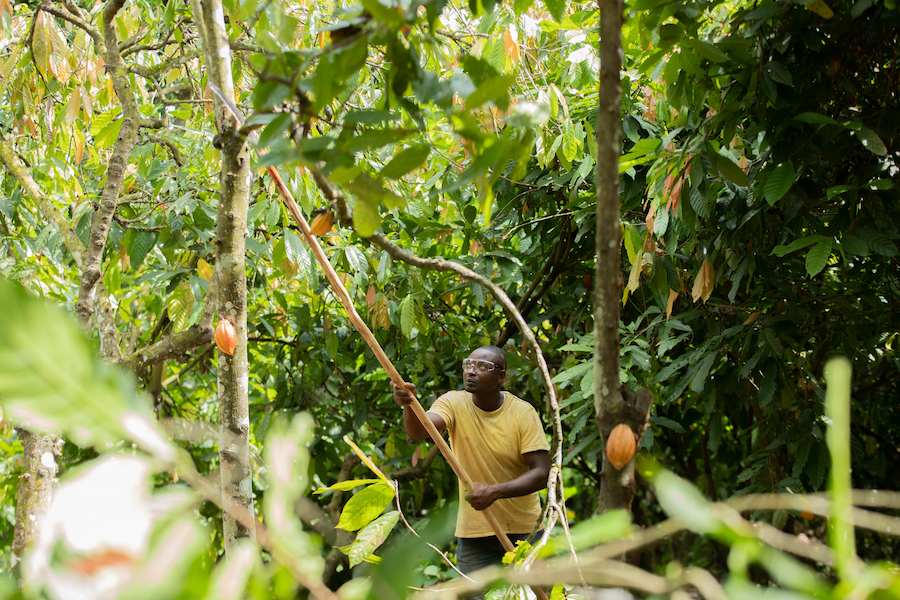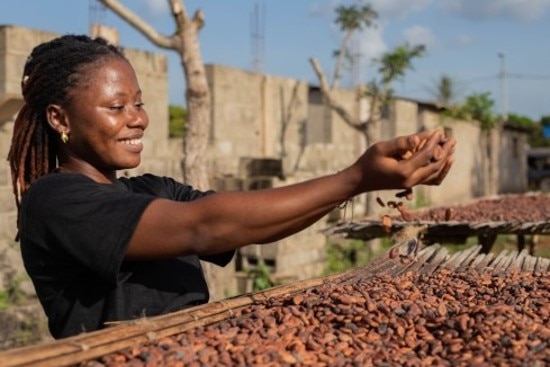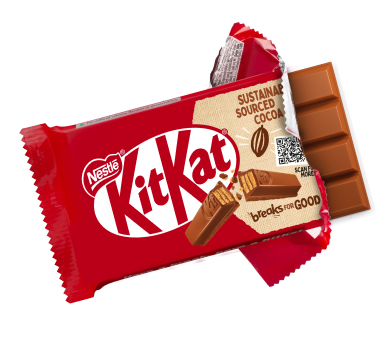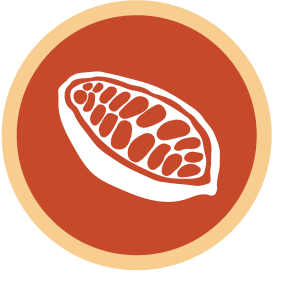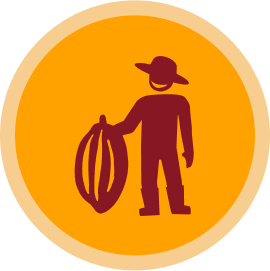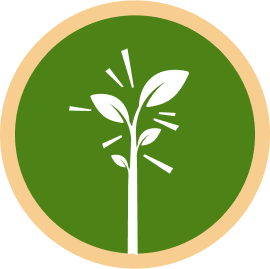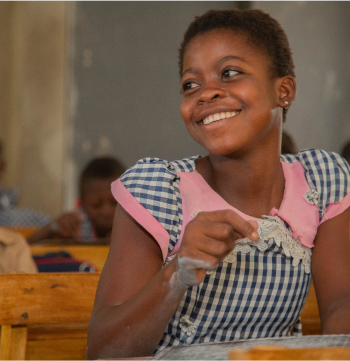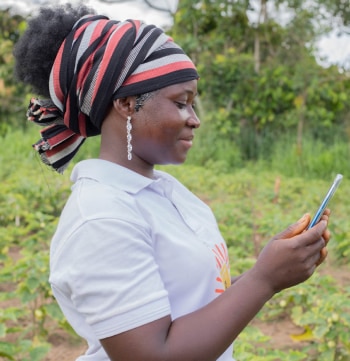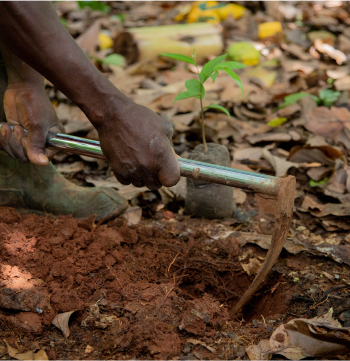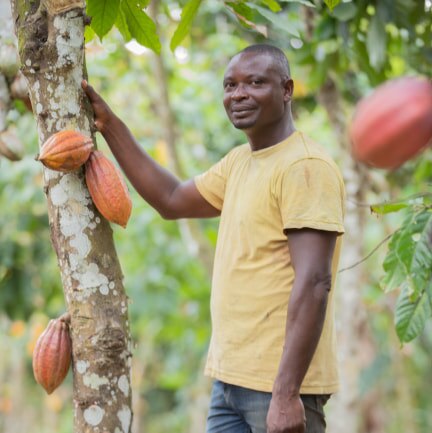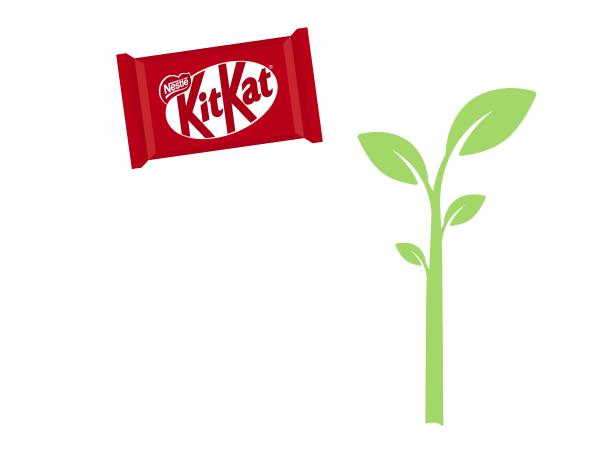



MORE TREES PLANTED
We are committed to teaching cocoa farmers the importance of pruning and using a greater variety of native species.
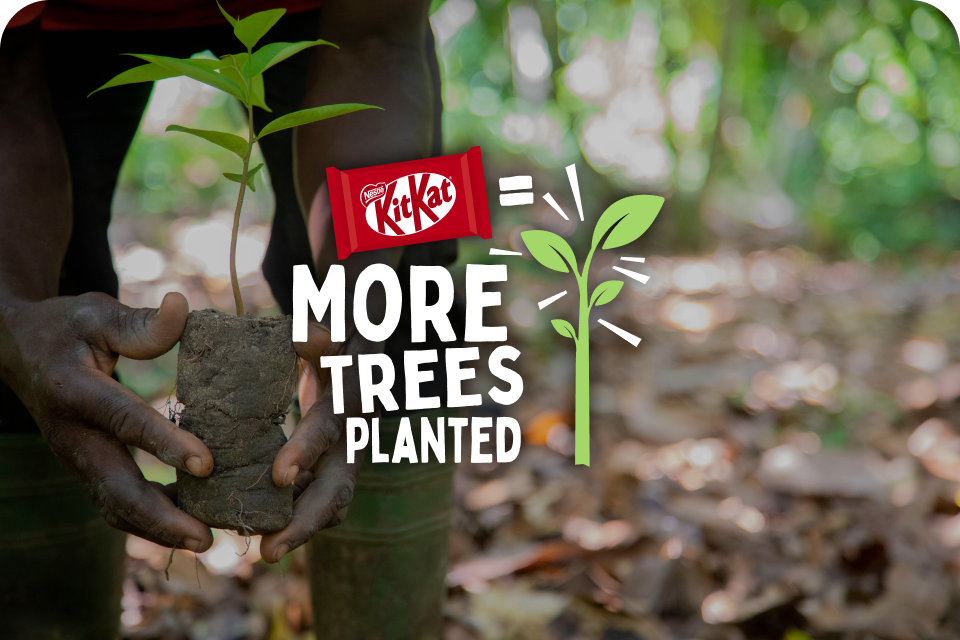
More Tree Planted
COCOA TREE ALSO LOVE COMPANY
Ti trovi qui perché hai scannerizzato l'esclusivo QR code presente sul tuo KitKat®! Siamo felici che tu l’abbia fatto, perché ora possiamo raccontarti in che modo la tua pausa sta contribuendo a fare del bene!
Lo vedi quel KitKat® che stai sgranocchiando? Fa parte di un programma innovativo che contribuisce ad aumentare il reddito delle famiglie dei coltivatori di cacao in Costa d'Avorio e sostiene la scolarizzazione dei loro figli. L’income accelerator program adotta un approccio unico, incentrato sulla famiglia con l'ambizione di produrre un impatto reale e duraturo sulla vita e sul futuro di queste famiglie, premiandole per l'attuazione di buone prassi.
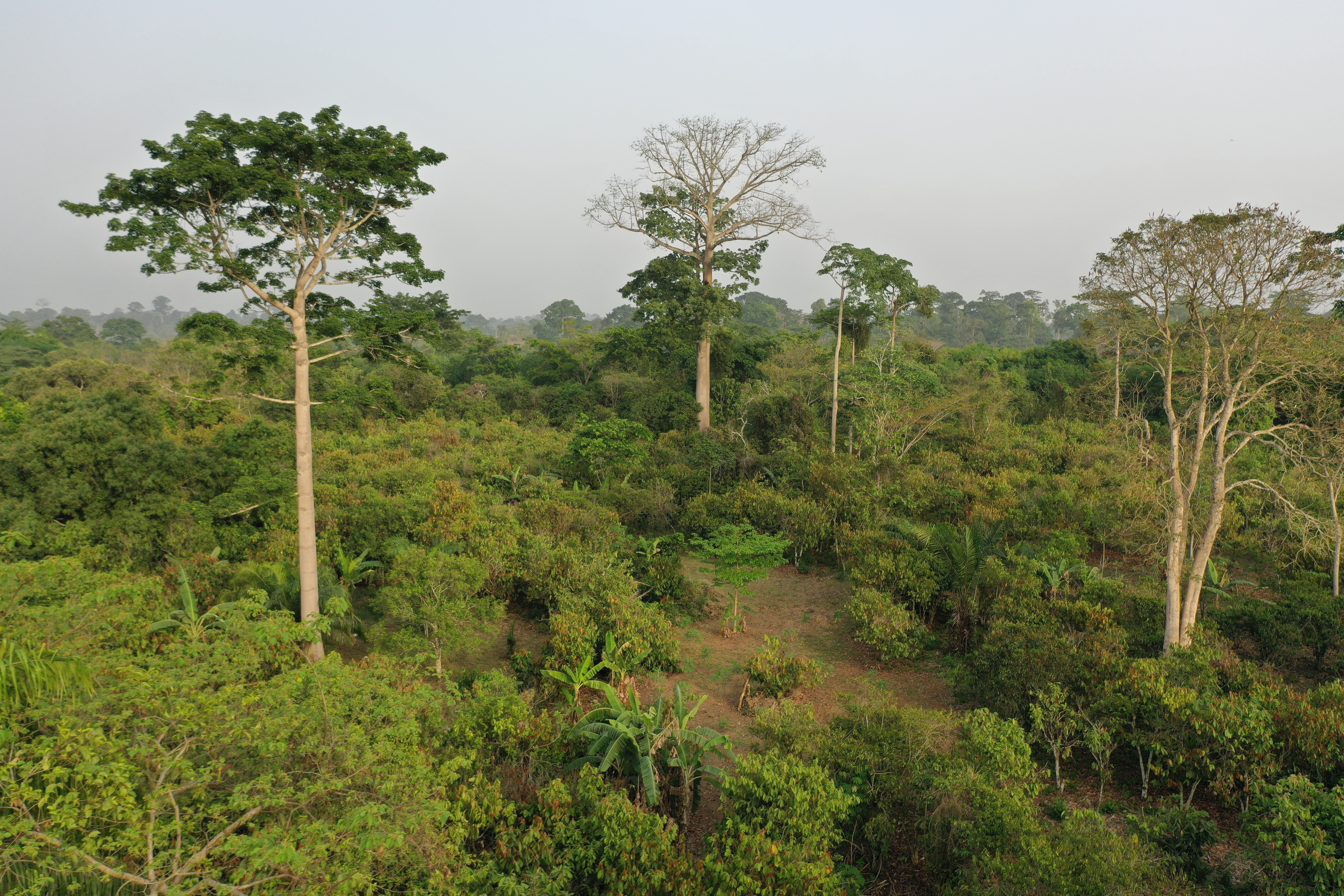
More Tree Planted
PRIMA DI APPROFONDIRE LE ORIGINI DELL’INCOME ACCELERATOR PROGRAM...
Vediamo cosa abbiamo realizzato finora...
Solo nel 2022, il Nestlé Cocoa Plan ha distribuito oltre 1 milione di alberi da frutto e alberi forestali¹. Sì, proprio sei zeri! Questi alberi sono stati consegnati direttamente ai coltivatori di cacao con cui collaboriamo in Costa d’Avorio. Con il programma di accelerazione del reddito, abbiamo voluto valorizzare questa esperienza e piantare ancora più alberi.
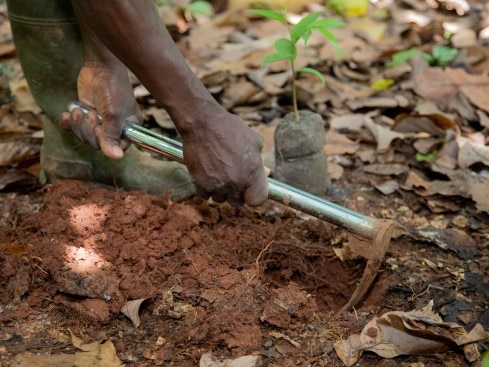
Perché è così importante, vi chiederete?
Beh, gli alberi da frutto e forestali offrono un’ombra preziosa alle piante di cacao, contribuendo a ridurre gli effetti del cambiamento climatico.
Inoltre, piantare una varietà di alberi aiuta a sostenere la biodiversità dell’area, migliora la salute del suolo e, di conseguenza, favorisce l’intero ecosistema locale. Si può dire, quindi, che siano davvero una buona compagnia per il cacao.
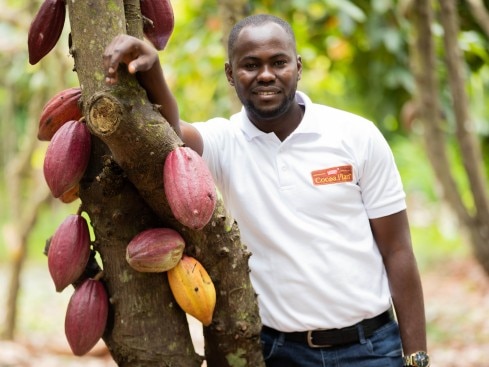
Ma come funziona tutto questo all’interno dell’Income Accelerator?
Incoraggiamo gli agricoltori a piantare almeno 10 alberi per ettaro nel primo anno. Proprio come le nostre barrette di cioccolato, il processo è ben confezionato: consegniamo gli alberi direttamente alle piantagioni di cacao e, una volta piantati, l’incentivo economico viene inviato direttamente nelle mani della famiglia contadina tramite pagamento mobile.
Ancora meglio: l’incentivo è uguale per tutti, indipendentemente dalla dimensione della piantagione. In questo modo, anche i piccoli coltivatori possono guadagnare, assicurandoci che nessuno venga lasciato indietro.
E non ci fermiamo una volta che gli alberi sono piantati: con il supporto dei nostri partner, torniamo a verificare che gli alberi stiano crescendo bene e prosperando.
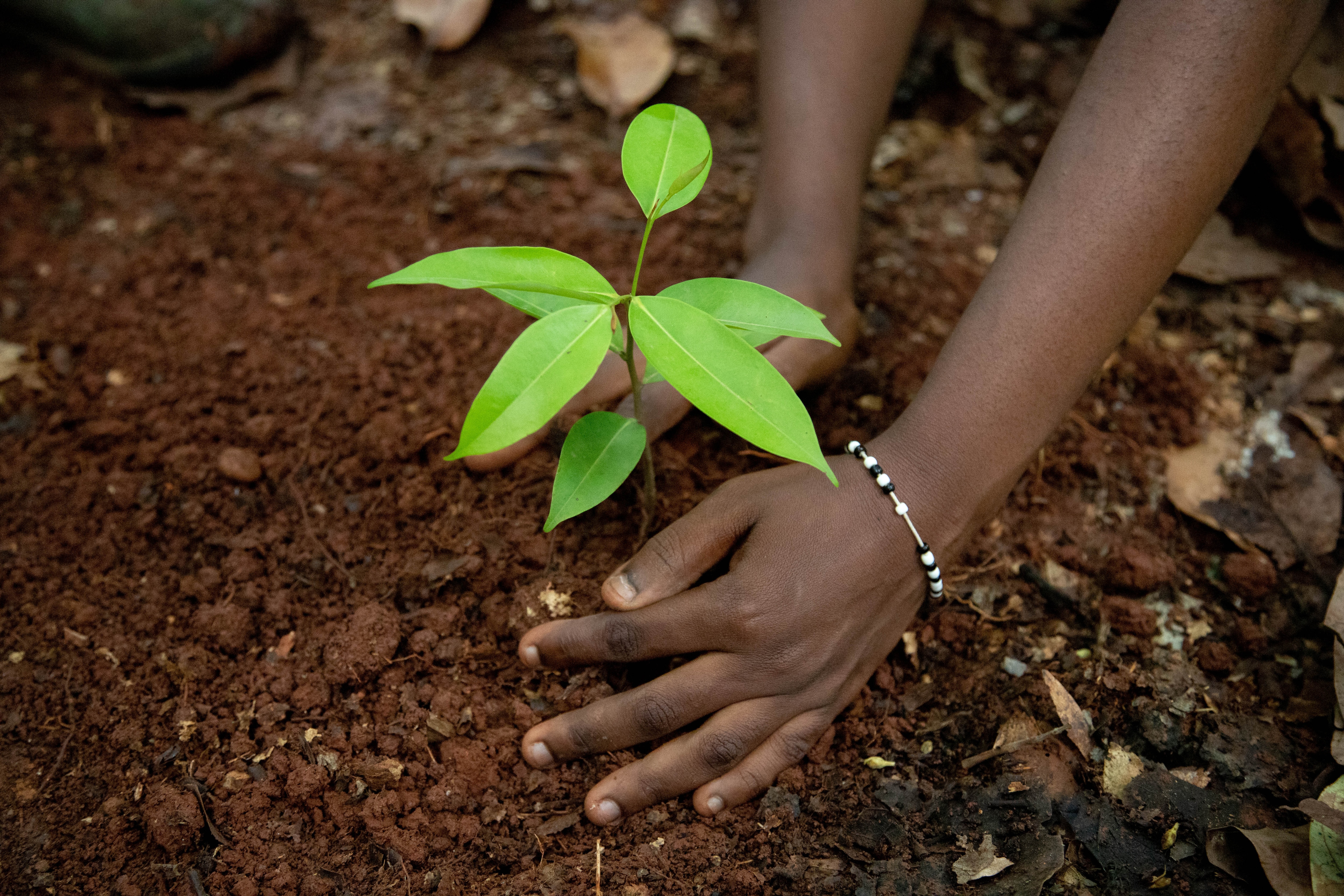
More Tree Planted
QUANTI ALTRI ALBERI SONO STATI PIANTATI GRAZIE ALL’INCOME ACCELERATOR?
Il nostro obiettivo iniziale era piantare 100.000 alberi nel primo anno, ma ne abbiamo già piantati oltre 200.000.
Vogliamo continuare a far crescere questo numero — proprio come i nostri alberi — con l’ambizione di piantare altri 300.000 alberi nel prossimo anno. Crediamo che più foreste e alberi da frutto vengono piantati, meglio sarà per i coltivatori di cacao, le loro famiglie e, naturalmente, anche per il cacao stesso.
Finora il programma ha coinvolto oltre 10.000 famiglie di coltivatori in Costa d’Avorio — e il numero continua a crescere. Ma non ci fermiamo qui! Questo è solo un passo lungo un percorso che punta a espandere ulteriormente la portata del programma. Prima estenderemo la copertura in Costa d’Avorio, poi entreremo in Ghana, con l’obiettivo di raggiungere 160.000 famiglie nella nostra filiera entro il 2030.

MORE POWER TO WOMEN
Ci impegnamo ad aiutare le donne ad avere un maggiore controllo sul loro denaro, sulle loro famiglie e sulle loro comunità per mitigare la disuguaglianza di genere in Costa d'Avorio.
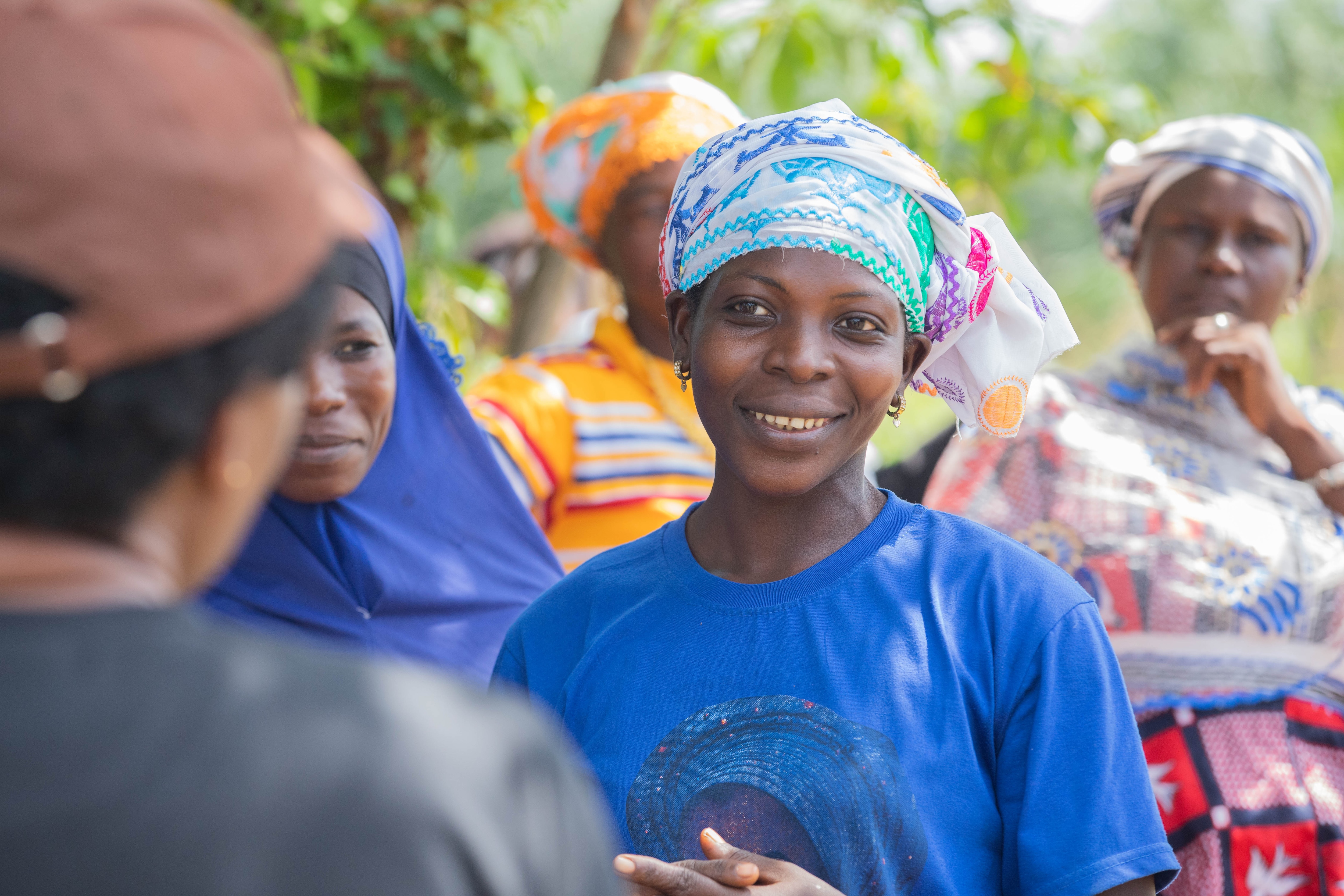
More Power to Woman
WOMAN ON A MISSION
L’Income Accelerator Program non riguarda solo il cacao: vogliamo che anche far crescere le persone. È universalmente noto che quando le donne hanno un ruolo più attivo nella società, tutti ne traggono beneficio.
Nelle comunità di coltivatori di cacao, è ancora comune che le donne dipendano completamente dal marito dal punto di vista finanziario. E purtroppo questo è influenzato da un più ampio squilibrio di parità tra i sessi. Se le donne avessero il potere di prendere decisioni e di sostenere le loro famiglie con un reddito secondario, non solo rafforzerebbero le famiglie, ma svolgerebbero anche un ruolo importante nella lotta al lavoro minorile.
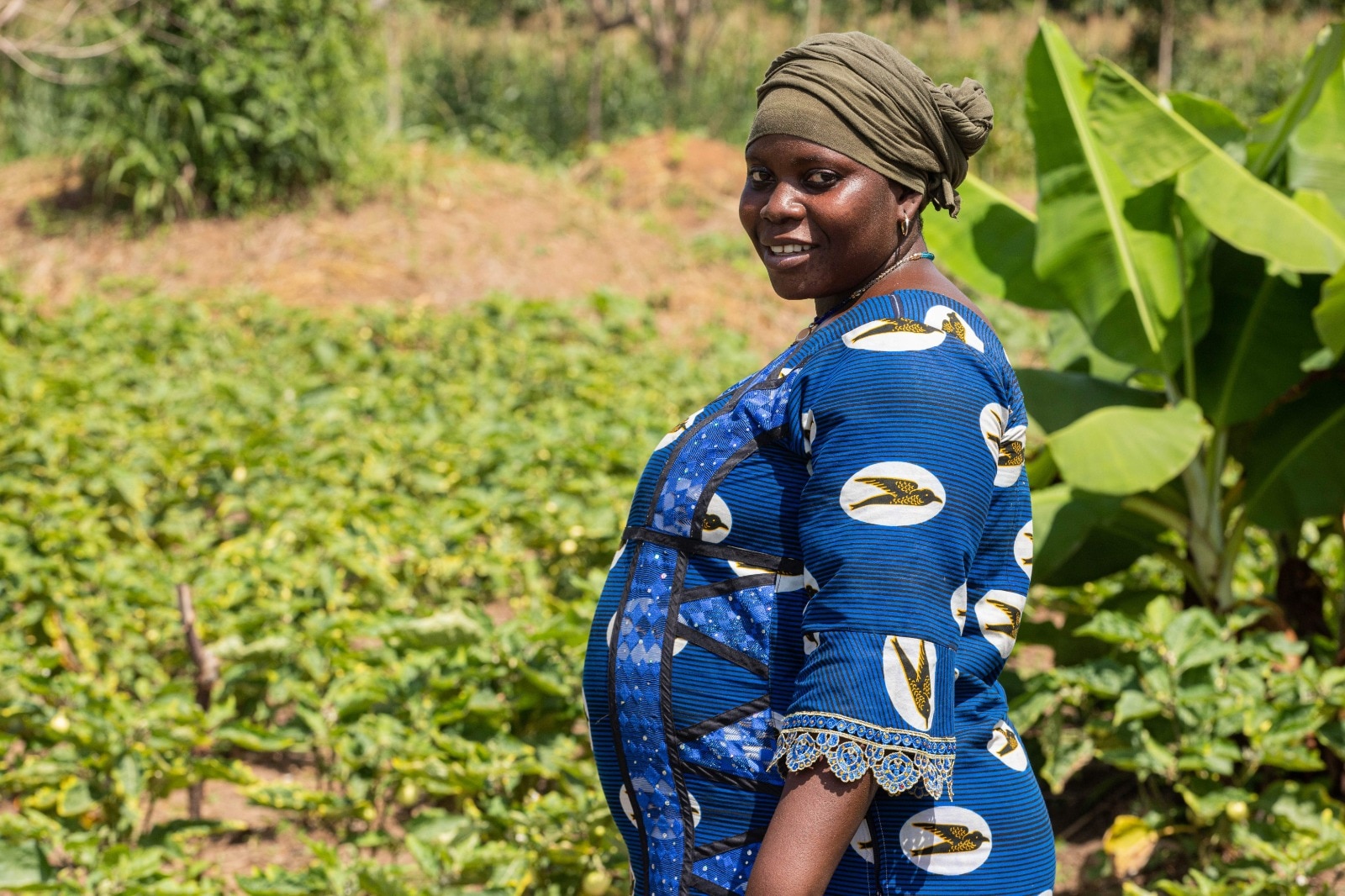
Ecco quindi un altro modo in cui vogliamo sostenere le 10.000 famiglie di coltivatori di cacao in Costa d'Avorio. Stiamo dando alle donne di queste comunità maggiori opportunità di successo.
Stiamo adottando un approccio olistico che si articola su due pilastri principali: dividere equamente gli incentivi tra i capifamiglia e fornire formazione sulla parità di genere e sulla diversificazione del reddito
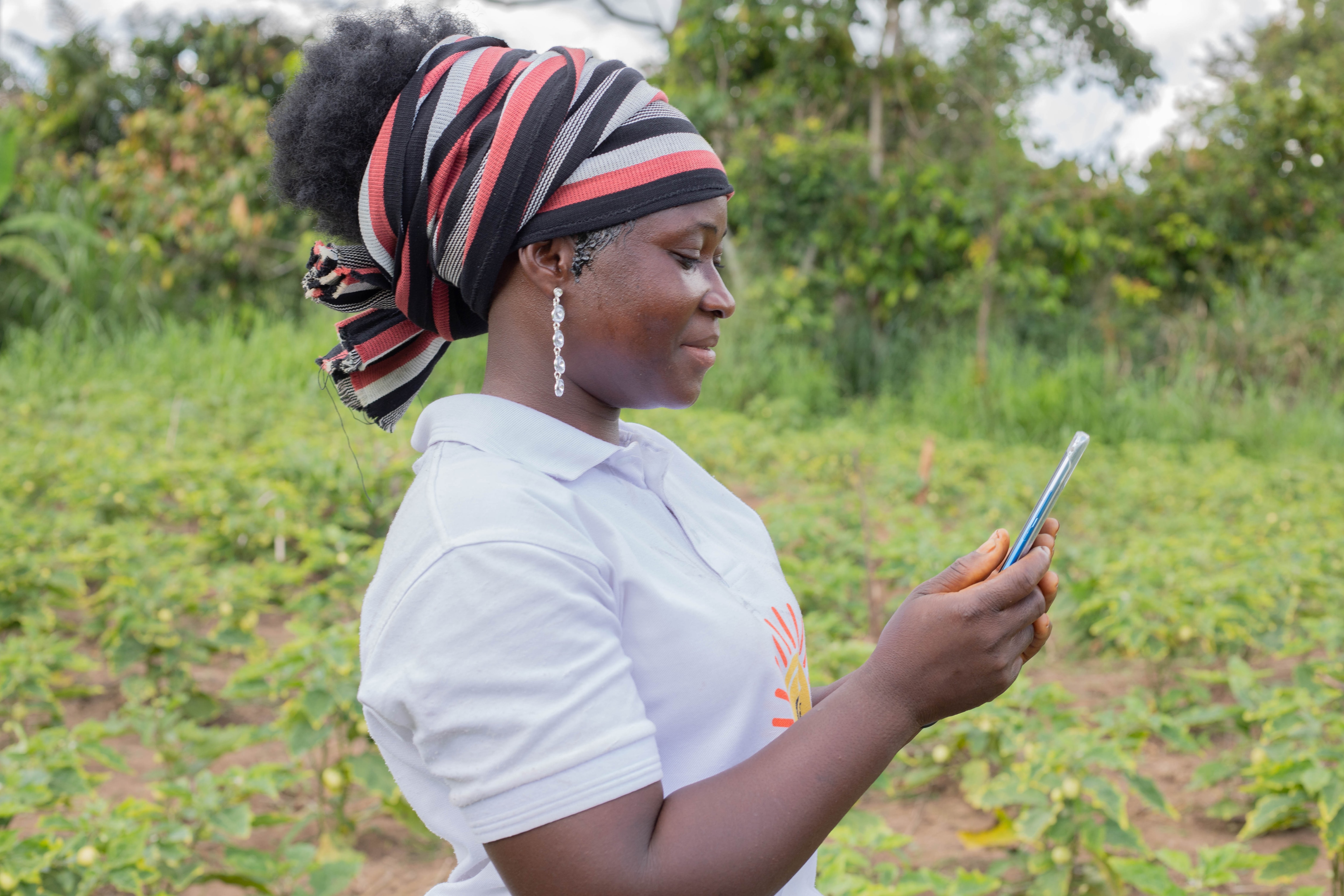
More Power to Woman
SPLIT INCOME 50/50
Per promuovere l'autonomia finanziaria delle donne, gli incentivi del programma di accelerazione del reddito sono divisi al 50% tra i due capifamiglia.
La percentuale della donna viene inviata direttamente a lei tramite un bonifico.
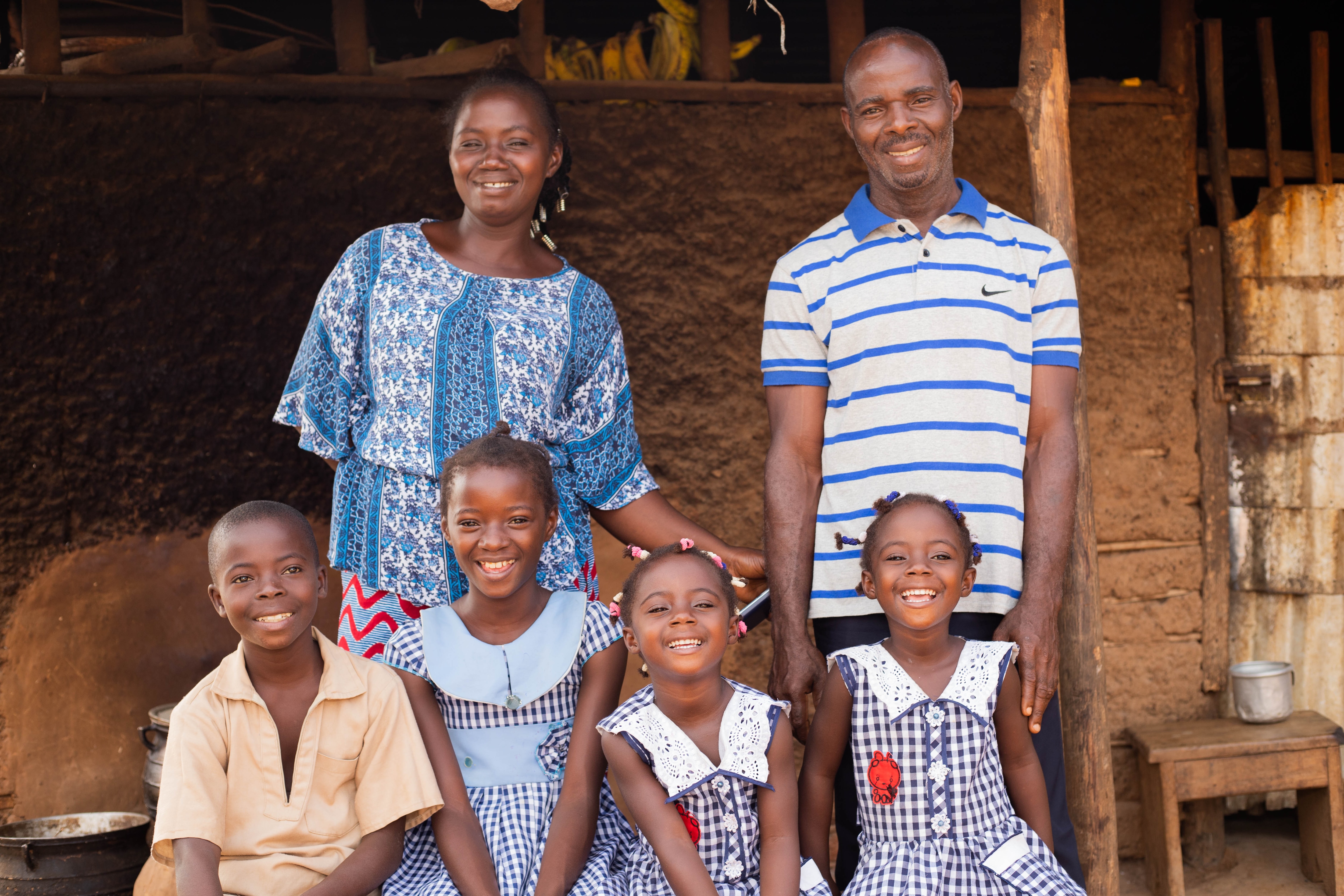
L'obiettivo? Incoraggiare l'uguaglianza di genere, aiutare i partner a condividere le responsabilità finanziarie e, in ultima analisi, costruire famiglie più resistenti.

More Power to Woman
TRAINING AND INCOME DIVERSIFICATION
Stiamo formando le donne ad avviare piccole imprese o attività che portino un secondo reddito alla famiglia. Tra queste figurano l'apicoltura, l'allevamento di bestiame come i polli e la vendita di ortaggi provenienti da orti gestiti dalla comunità.
L’Income Accelerator Program distribuisce poi un incentivo di 100 euro per la diversificazione del reddito, un ottimo trampolino di lancio per sviluppare una nuova idea imprenditoriale.
Anche in questo caso, i soldi vengono inviati in modo sicuro direttamente alle donne.
Ma la giustizia di genere non è solo una questione femminile. Utilizzando la metodologia del Gender Action Learning System, stiamo formando donne e uomini a riconoscere che possono ottenere di più e vivere meglio se lavorano insieme. Una donna può coltivare. Un uomo può aiutare in casa. Insieme possono assicurarsi che i loro figli siano al sicuro, nutriti, amati e istruiti.
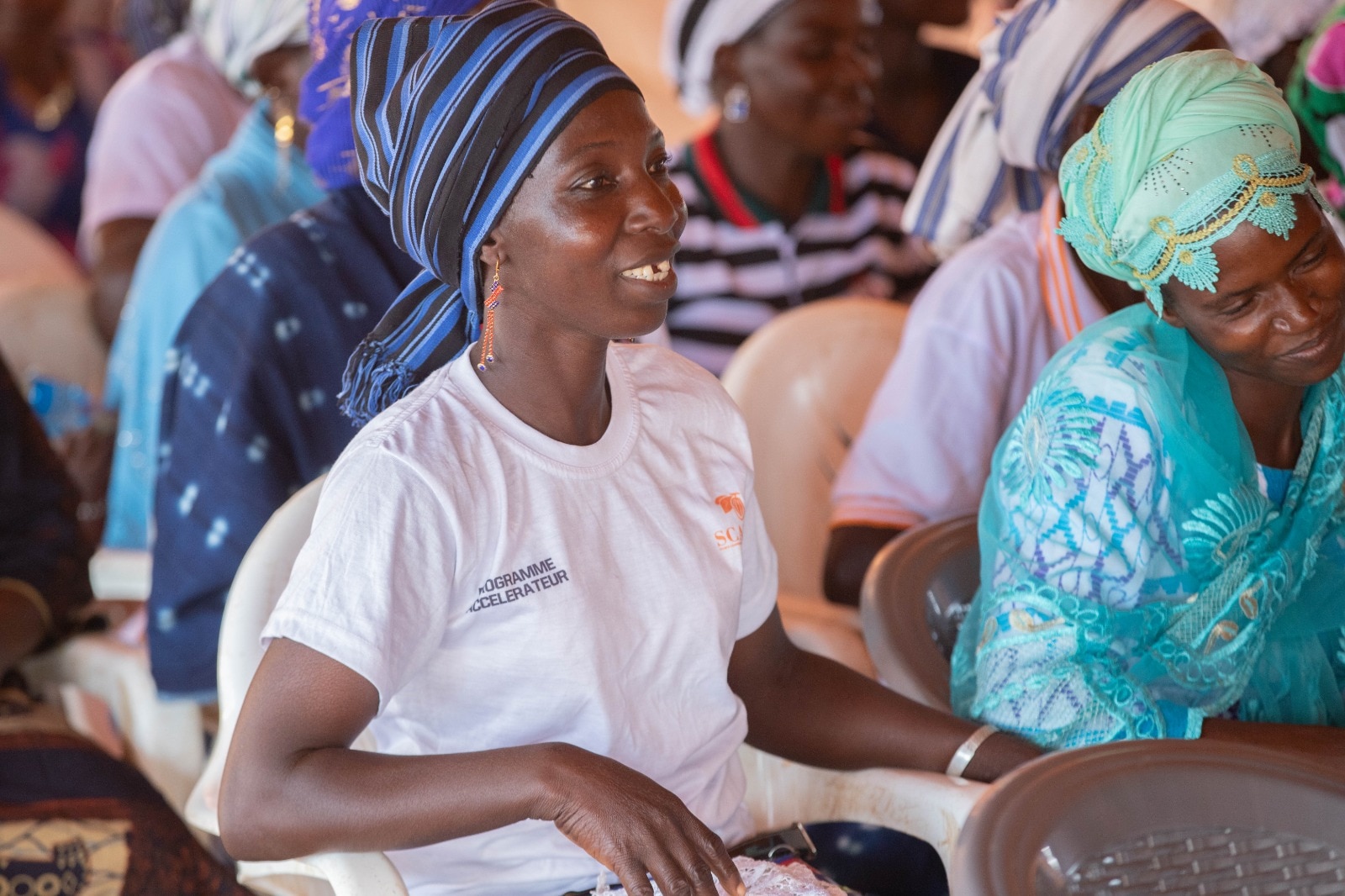
Abbiamo anche aiutato a creare associazioni di risparmio e prestito all'interno delle comunità. Autogestiti e autocapitalizzati, questi programmi incentrati sulle donne incoraggiano il risparmio e forniscono prestiti a piccole attività commerciali. Con l'abbattimento delle barriere finanziarie e il rafforzamento della fiducia in se stesse, le donne possono diventare artefici del cambiamento nelle loro comunità.
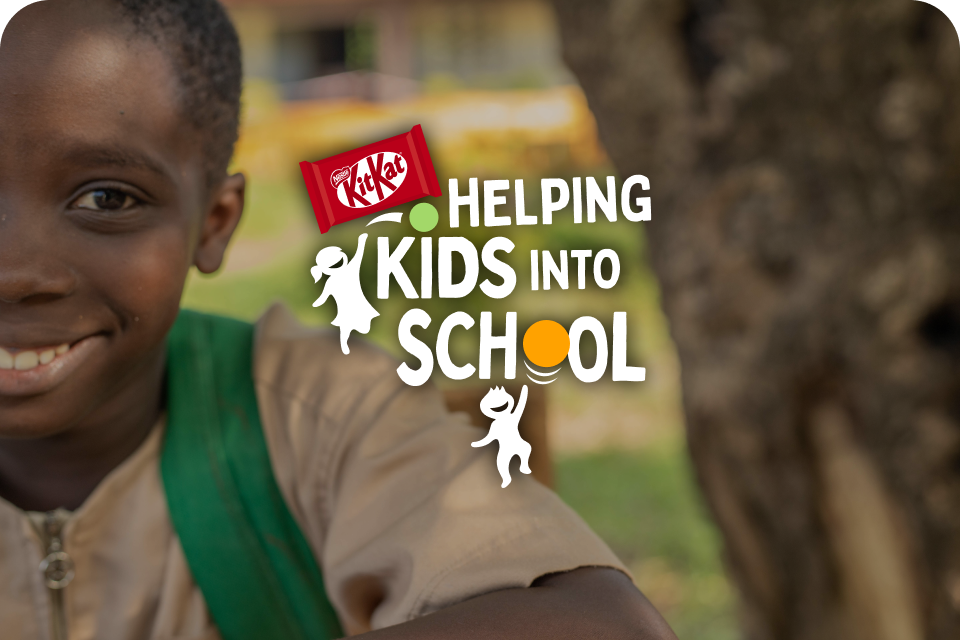
Helping kids into school
Helping Kids Break into Education
Ti trovi qui perché hai scannerizzato l'esclusivo QR code presente sul tuo KitKat®!(o forse ci hai trovati cercando online). Siamo felici che tu l’abbia fatto, perché ora possiamo raccontarti tutto il bene che la tua pausa sta aiutando a realizzare!
Il KitKat che stai gustando fa parte di un programma innovativo pensato per aumentare il reddito delle famiglie di coltivatori di cacao in Costa d’Avorio.
Il nostro programma di accelerazione del reddito adotta un approccio unico, incentrato sulla famiglia, con l’obiettivo di generare un impatto concreto e duraturo sulla vita e sul futuro delle famiglie di coltivatori di cacao. Un programma innovativo che premia le famiglie agricole per pratiche che non solo permettono di aumentare il loro reddito, ma che portano anche benefici all’ambiente locale e alla comunità.
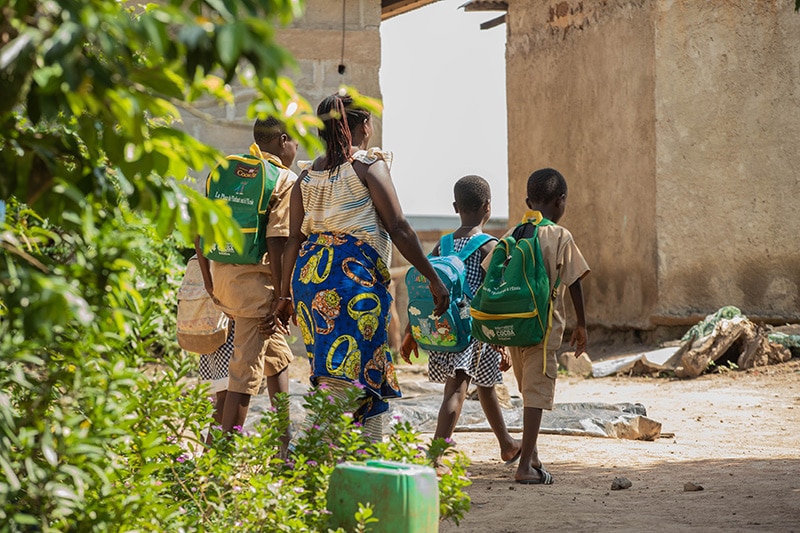
Helping kids into school
All parents hope for a brighter future for their kids, which ultimately starts with an education.
Vogliamo supportare i bambini delle famiglie di coltivatori di cacao affinché possano continuare a imparare a scuola – o, in alcuni casi, semplicemente iniziare.
Abbiamo appreso molto dal Nestlé Cocoa Plan, che dal 2012 ha aiutato a proteggere 156.974 bambini dal rischio del lavoro minorile. Il programma di accelerazione del reddito va ancora oltre, incentivando le famiglie a iscrivere i propri figli a scuola, in modo da garantire che il costo dell'istruzione non rappresenti più un ostacolo significativo per l'educazione dei bambini.

All'interno del programma di accelerazione del reddito, le famiglie di coltivatori di cacao possono guadagnare fino a 100 € per inviare i propri figli a scuola. Il 50% di questo importo viene pagato in anticipo, al momento dell'impegno dei genitori a iscrivere i propri figli. Il restante 50% viene corrisposto una volta confermato che i bambini hanno frequentato regolarmente la scuola.
Ecco tutto. E la cosa migliore è che paghiamo questo incentivo direttamente nelle mani delle famiglie di coltivatori di cacao, tramite pagamenti su telefono mobile. È semplice, trasparente e veloce. Supportiamo anche i bambini assicurandoci che abbiano ciò di cui hanno bisogno a scuola, fornendo kit scolastici di cancelleria, matite, libri e sussidi per la mensa scolastica.
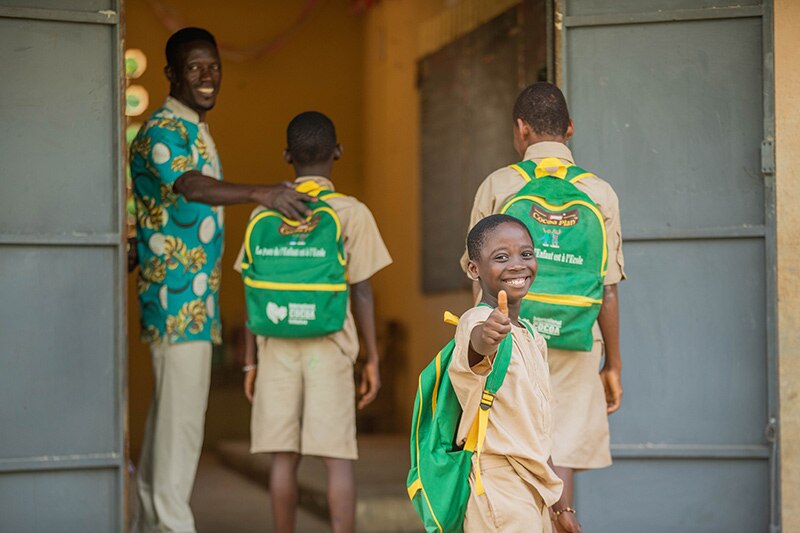
Helping kids into school
By incentivising school attendance, we’re aiming to help many more kids kickstart their education.
Finora, il programma ha coinvolto 10.000 famiglie di coltivatori di cacao (e il numero è in continua crescita) in Costa d’Avorio.
Ma non ci fermiamo qui! Questo è solo un primo passo: l’obiettivo è estendere progressivamente il programma, prima in Costa d’Avorio e in Ghana, per poi arrivare a coinvolgere entro il 2030 ben 160.000 famiglie di coltivatori di cacao all’interno della nostra filiera.
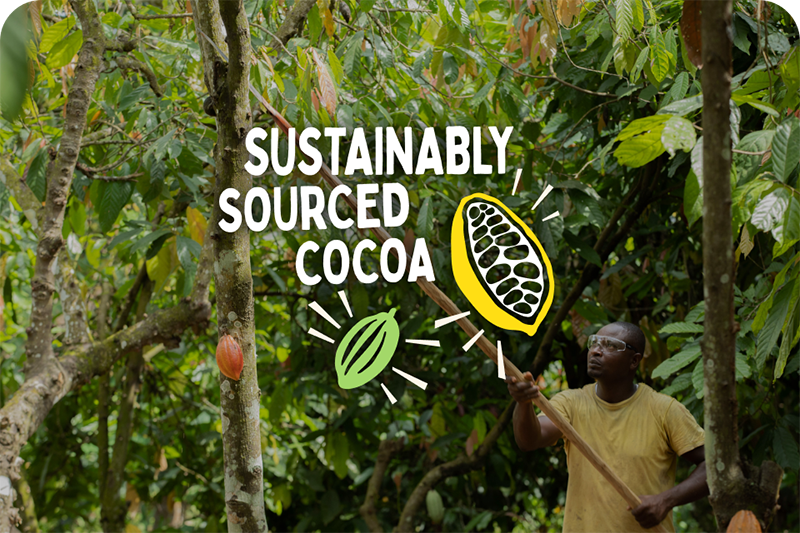
Sustainably Sourced Cocoa
It is time to let you in on a secret…
Contrariamente a quanto potresti pensare, i baccelli di cacao non sono solo la materia prima per il cioccolato. Vengono trasformati in diversi ingredienti deliziosi che svolgono un ruolo importante nella tua barretta di cioccolato. Sono la fonte del burro di cacao, del cacao in polvere, delle scaglie di cacao e della massa di cacao.
Per rendere il tutto più semplice da capire, dai un’occhiata all’immagine sintetica qui sotto…
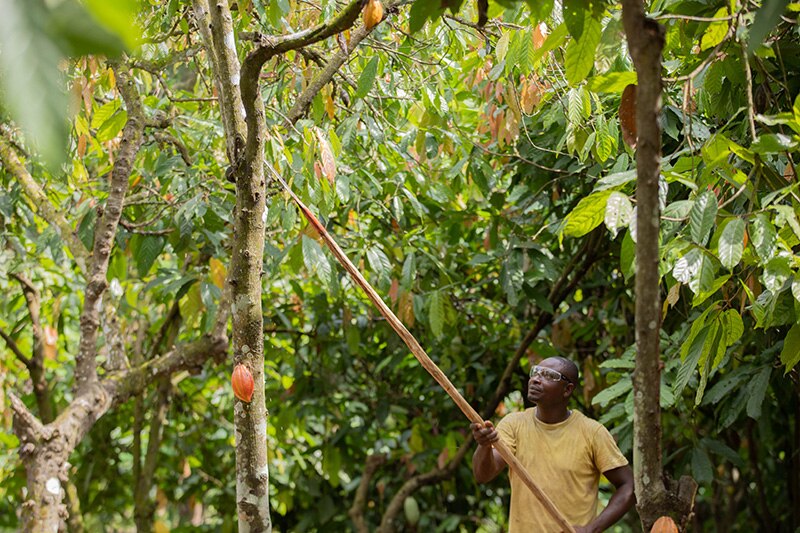
Sustainably Sourced Cocoa
Our ambition behind sustainably sourced cocoa
La nostra storia comincia dal cacao approvvigionato in modo sostenibile — l’ingrediente più goloso delle barrette KitKat®.
Ma aspetta un attimo… cosa significa davvero?
Scopriamolo insieme, partendo dal momento in cui il baccello di cacao inizia a crescere sull’albero, fino all’ultimo morso della tua pausa cioccolatosa.
Dal lancio del Nestlé® Cocoa Plan nel 2009, lavoriamo fianco a fianco con le famiglie di coltivatori di cacao per adottare pratiche che puntano a migliorare le condizioni di vita all’interno delle comunità agricole. Questo include, ad esempio, fornire formazione e risorse per aumentare la resa e la qualità del raccolto, ma anche sostenere lo sviluppo delle comunità locali, valorizzando il ruolo delle donne e promuovendo l’accesso all’istruzione.
KitKat® è stato il primo marchio globale di Nestlé® a utilizzare esclusivamente cacao proveniente dal Nestlé Cocoa Plan, incluse le aziende agricole certificate*. Un passo importante, che ha aperto la strada alla nostra attuale filiera del cacao sostenibile.
Ma prima di entrare nei dettagli, concentriamoci sul protagonista: il baccello di cacao.
* Il cacao proveniente dal Nestlé Cocoa Plan include volumi certificati Rainforest Alliance e cacao verificato tramite sistema mass balance.
Mass balance significa che acquistiamo una quantità di cacao certificato equivalente al volume utilizzato nel prodotto, anche se non è fisicamente separato lungo tutta la filiera.

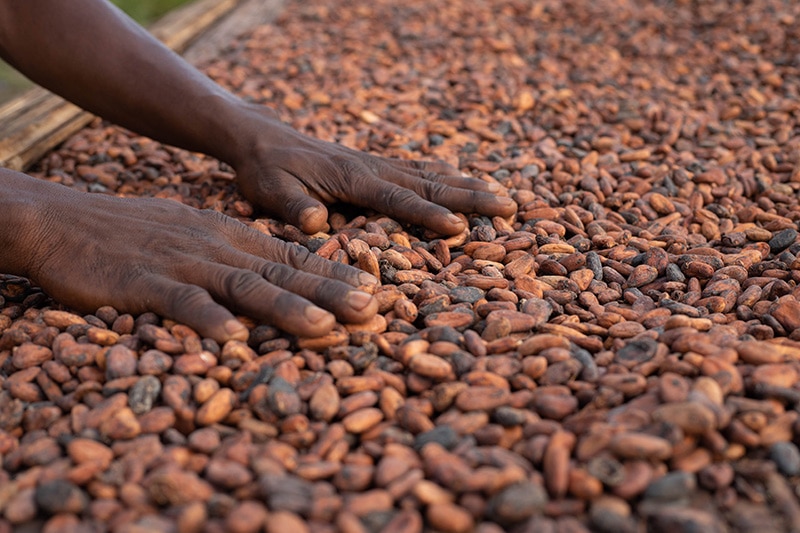
Sustainably Sourced Cocoa
But what does this have to do with sustainable cocoa?
Siamo felici che tu lo abbia chiesto, perché è il momento di entrare nei dettagli. Dal 2009, grazie al Nestlé® Cocoa Plan, abbiamo fatto tanta strada — e naturalmente, abbiamo anche imparato molto. Queste solide basi ci hanno permesso di lanciare il nostro innovativo programma di accelerazione del reddito, con l’ambizione di migliorare concretamente le condizioni di vita delle famiglie di coltivatori di cacao.
Il programma premia le famiglie non solo per la quantità e la qualità delle fave di cacao che producono, ma anche per le pratiche che portano benefici all’ambiente e alla comunità locale. Finora il programma ha coinvolto oltre 10.000 famiglie in Costa d’Avorio — e il numero continua a crescere. Ma non ci fermiamo qui! Questo è solo l’inizio di un percorso più ampio: l’obiettivo è quello di estendere la portata del programma, prima ampliando la copertura in Costa d’Avorio, poi avviandolo anche in Ghana, fino a raggiungere 160.000 famiglie all’interno della nostra filiera entro il 2030.
Il cacao utilizzato per produrre le barrette KitKat® della linea “Breaks For Good” proviene direttamente dal programma di accelerazione del reddito ed è completamente tracciabile: dai gruppi di coltivatori fino ai nostri stabilimenti di produzione a Amburgo e Sofia.
Cosa significa, in pratica?
È qui che viene la parte interessante. Puoi immaginare le fave di cacao come se viaggiassero con un passaporto virtuale, che viene “timbato” a ogni fase del loro percorso. In altre parole, sono tenute separate dalle altre fave, garantendo così una tracciabilità completa.
Questo ci permette di assicurarti che il cacao contenuto nella tua barretta KitKat proviene davvero da questo programma innovativo ed è stato approvvigionato in modo sostenibile, anche grazie alla certificazione Rainforest Alliance. È il primo passo verso una piena separazione di tutti gli ingredienti a base di cacao, mentre continuiamo a collaborare con i nostri fornitori per aumentare i volumi segregati e far crescere ulteriormente il programma.
Un’immagine vale più di mille parole, no?
Ecco perché abbiamo pensato che questa potrebbe spiegartelo ancora meglio:
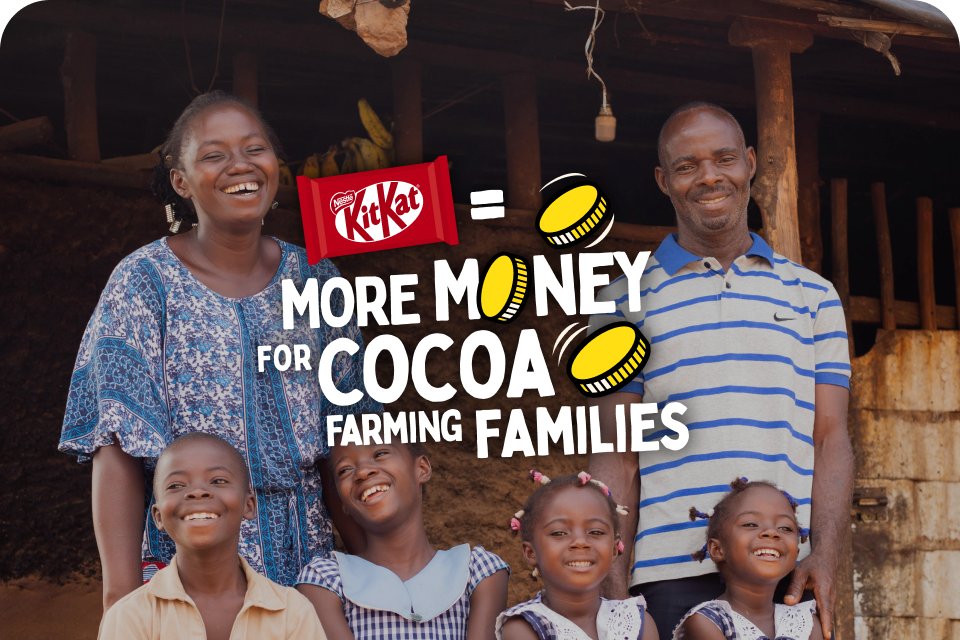
More Money for Cocoa Farming Families
Breaks and incentives coming together
Ti trovi qui perché hai scannerizzato l'esclusivo QR code presente sul tuo KitKat®!(o forse ci hai trovati cercando online). Siamo felici che tu l’abbia fatto, perché ora possiamo raccontarti tutto il bene che la tua pausa sta aiutando a realizzare!
Il KitKat che stai gustando fa parte di un programma innovativo pensato per aumentare il reddito delle famiglie di coltivatori di cacao in Costa d’Avorio.
Il nostro programma di accelerazione del reddito adotta un approccio unico, incentrato sulla famiglia, con l’obiettivo di generare un impatto concreto e duraturo sulla vita e sul futuro delle famiglie di coltivatori di cacao. Un programma innovativo che premia le famiglie agricole per pratiche che non solo permettono di aumentare il loro reddito, ma che portano anche benefici all’ambiente locale e alla comunità.
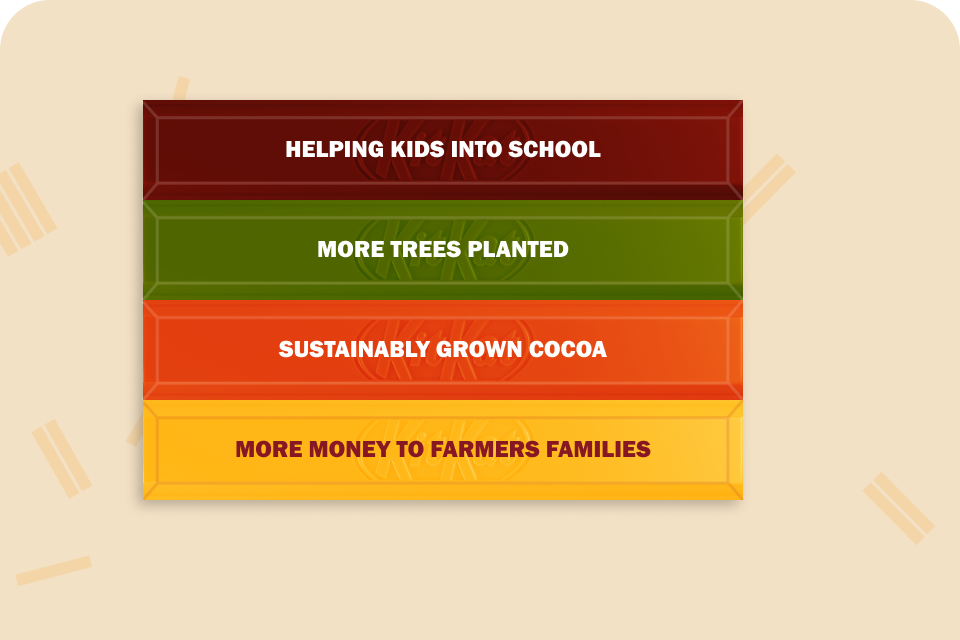
More Money for Cocoa Farming Families
Four-fingers, four pillars
Proprio come le quattro barrette di un KitKat, abbiamo quattro pilastri che danno vita al programma di accelerazione del reddito. Questi quattro pilastri si concentrano su buone pratiche e, se tutti vengono raggiunti, le famiglie di coltivatori di cacao possono guadagnare fino a 500 euro di reddito extra all'anno:

1. Aiutare i bambini della comunità, di età compresa tra 6 e 16 anni, ad andare a scuola.

2. Migliorare le pratiche agricole, come la potatura, per aumentare la produttività delle coltivazioni.

3. Piantare alberi da frutto e foreste nelle piantagioni di cacao, che aiuta gli alberi di cacao a resistere ai cambiamenti climatici e fornisce un reddito aggiuntivo per i coltivatori.

4. Dare potere alle donne per avviare attività imprenditoriali. Questo può includere la coltivazione di altre colture, l'allevamento di animali come polli, l'apicoltura o la vendita di verdure provenienti da orti gestiti dalla comunità.
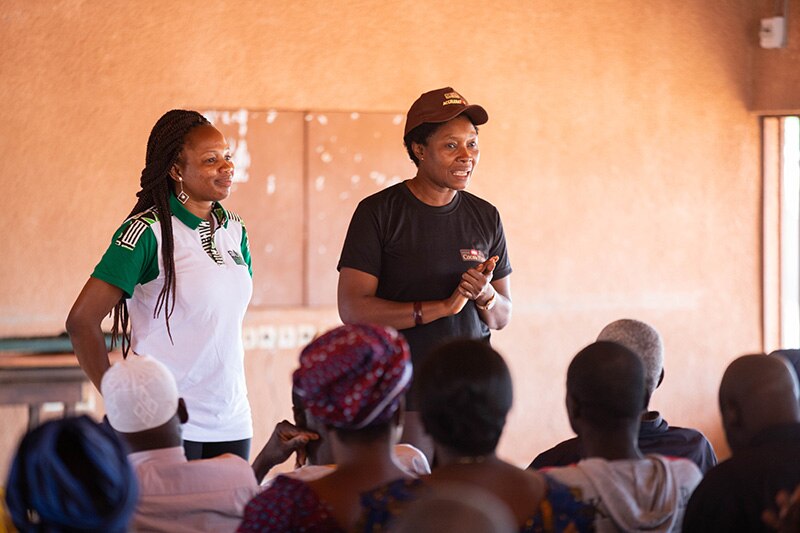
More Money for Cocoa Farming Families
How are these incentives paid?
Forniamo un sostegno diretto alle famiglie di coltivatori di cacao.
Gli incentivi vengono erogati direttamente e in modo equo: li dividiamo in due parti, una destinata a ciascun capofamiglia. Così facendo, favoriamo l’equità di genere e aumentiamo le probabilità che queste risorse vengano reinvestite nell’istruzione e nel benessere della comunità.
Offrendo benefici economici immediati attraverso questi incentivi, il nostro obiettivo è creare un ambiente che permetta alle famiglie di coltivatori di cacao di costruire un futuro migliore per sé stesse e per le generazioni a venire.
Si potrebbe dire che non vogliamo solo rendere il mondo più dolce, ma anche più luminoso.
Ad oggi collaboriamo con 10.000 famiglie di coltivatori di cacao (e il numero è in crescita) in Costa d’Avorio, grazie al nostro programma Income Accelerator.
E non ci fermiamo qui: questo è solo un primo passo verso l’espansione del programma in Ghana, con l’obiettivo concreto di supportare attivamente 160.000 famiglie di coltivatori di cacao entro il 2030.
